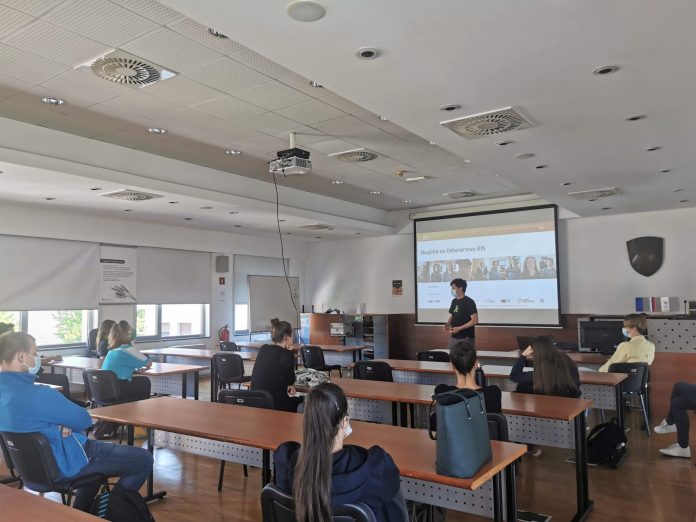One of the key activities of the researcher is sharing her or his peer-reviewed findings, in standard practice with the scientific community, which can use new facts to bring research to the next level. But this is only half of the story: at least as important is also passing the knowledge in non-scientific terms – I am trying to avoid the phrase »layman terms« – to other potential target groups. The latter is at least as important as the former as it brings about both the societal progress and acceptance of science in the non-scientific part of the society. In the last few years, we were frequently shocked how little trust there is in scientific findings regarding COVID within the society: one would like to lay blame at social media publishing non-peer revied »facts«, but we the scientists also share guilt for locking away ourselves from the people.
Occasionally, I have contact with students, lecturing about insect biology and beekeeping. It is then when fear that my best effort might not be enough and that the message might not get through creeps up on me. Let me explain: beside fractographic knowledge, which can be obtained by a student from many – often unverified – sources, teacher’s duty is to teach students of analytical thinking, to evaluate data they have access to with the critical eye. This is now much more important as it was in my generation, which didn’t know google and general news sources usually had authors with names and reputation to go along. The educational system, however, seems to be stuck at some point in the past, still passing the facts in heaps but no method what to do with them. Finally, responsibility for own actions seem to be nowhere to be found, neither in past neither in current curriculums. At most, it is mentioned in the light of criminal deeds. Environment is not mentioned here.
Thinking green is a key direction of a decade. And similarly, like COVID has its opponents as, trying to reduce its importance or talk down the consequences of living life »in traditional way«. Like every buzzword also has leaches attached to, making business out of it, and reducing its value to the monetary terms only. The students I am talking with are not stupid or ignorant but somehow guideless in this manner and thus an easy prey.
Often, looking at honey bee colonies together with students we are talking about how the demands, expectations and technology have changed beekeeping in the last 20 years. Science has even coined the phrase “Colony Collapse Disorder” (CCD), a phrase known to many even outside sector. But now it is clear that CCD and other pest and pathogens that arrived recently are emerging the consequence of irresponsible human behavior, such as global trade chains, trying to increase profit by changing local species for another and forgetting that evolution took millions of years to adapt hosts to pests and vice-versa and that simply mending the leaky cauldron will give us not new but a patched pot. In BeeConSel we are dedicated conserve the local genetic pools. This knowledge and the awareness that homegrown is something of worth having in the apiary, is something we on BeeConSel team try to pass on to students who will be future apiarists, but also future government administrators, issuing permits, sanctioning subsidies, etc. Even those, who stay outside the beekeeping or related apiculture sector count in the debate or steering the community.
Dr Janez Prešern


